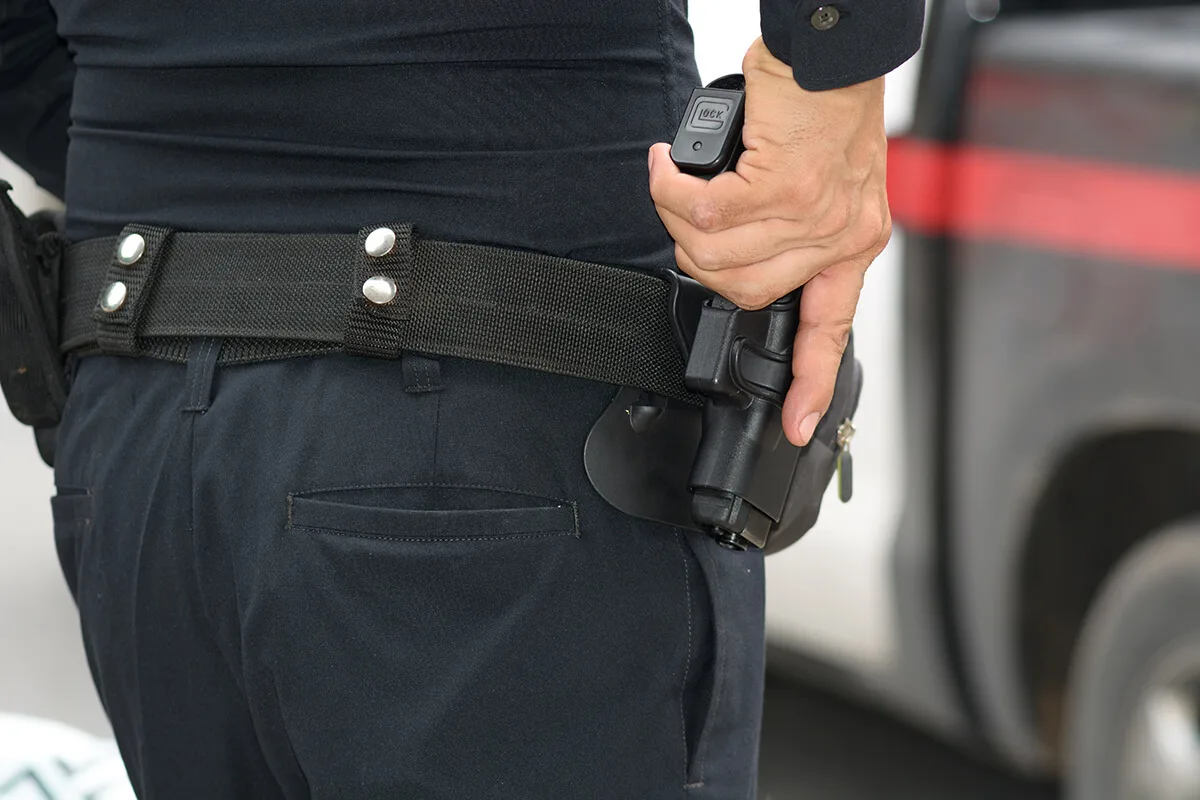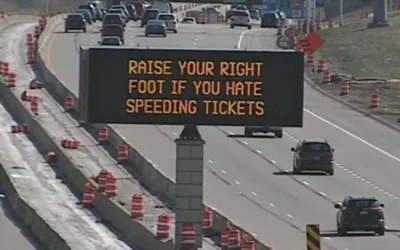
#image_title
The task force’s work continues, even as it appears to be falling behind schedule.
ReBecca Burrell has witnessed and experienced enough police brutality to distill her thoughts into one succinct sentence.
“If you pull out your weapon, your deescalation is crap,” said Burrell, an activist and citizen member of Assembly Speaker Robin Vos’ Task Force on Racial Disparities.
Her observation was one of the most piercing statements in an hours-long debate during a Thursday task force meeting that revealed the deep divisions among members of the group tasked with recommending statewide police reforms. The task force’s law enforcement policies and procedures subcommittee, made up of activists, pastors, and law enforcement officials, hit minor bumps as figures from divergent walks of life tried to find common ground.
The 32-member task force, aimed at addressing Wisconsin’s nation-worst racial disparities, is split into two subcommittees—one focused on education and economic development and the other on law enforcement policies and procedures. Two Democratic and two Republican lawmakers oversee 28 community members. The task force has no legislative authority, but will make recommendations based on its conclusions.
The 19 members of the police subcommittee have identified common issues, but the group is generally divided on how to best solve them. Thursday’s meeting addressed a range of topics: whether police officers should be required to file a report every time they pull out their gun; whether cops should be outright banned from using potentially deadly chokeholds to restrain people; whether all officers should be required to wear body cameras, and when they should be recording; and whether the state should define and regulate police use-of-force, which is currently up to each individual law enforcement agency to decide.
Mandatory reporting for drawing guns
Some committee members hope to require police to report every time a gun is drawn, a policy they say would help identify officers who are too quick to escalate situations by pulling out their gun and discourage officers from unnecessarily drawing their guns because the action would be tracked.
“It could lead to us finding out certain Officer A has a problem because he always goes to deadly force before he tries any other level of deescalation,” said Rep. Shelia Stubbs (D-Madison), one of the task force’s co-chairs.
But that proposal received significant pushback from members of law enforcement on the subcommittee, who were skeptical of the purpose of such a requirement and said it would tie up officers in too much paperwork when they should be out on the streets.
“It would just be an inordinate amount of information, and I’m not sure exactly what we would glean from that,” said Wayne Strong, a Black retired Madison police lieutenant.
West Allis Police Chief Patrick Mitchell, who is white, argued that it is simply a fact of life that officers will pull their guns in certain situations, so he said it isn’t something that needs to be meticulously tracked. He gave the example of police pulling over a vehicle they suspect to be stolen.
“Police officers are probably going to have their firearm in their hand,” Mitchell said. “It doesn’t mean they’re going to point it at you. It doesn’t mean they’re going to shoot you.”
Danilo Cardenas, secretary-treasurer of the Milwaukee Police Association, also raised a hypothetical situation in which 10 police respond to a possible break-in but don’t find anyone inside the building.
“You can have 10 guys searching a building and you’re going to have 10 use of force reports filed,” he said.
Mitchell said officers being required to file paperwork may discourage them from drawing their guns in situations where perhaps they should be armed.
But Burrell shot back, arguing the amount of paperwork is irrelevant, because an officer with a gun drawn is prepared to use deadly force.
“I’ve had guns drawn to my head,” she said. “That needs to be reported. And I’m not worried about how much data it’s going to take…. Maybe that’s the accountability that needs to take place, for officers to know, ‘Hey, I’m going to be doing this paperwork. I’m not going to pull out my gun unnecessarily.’”
Dannie Evans, a Black Janesville minister and former probation and parole agent, said he was once pulled over because the officer said his car matched the description of a recently stolen vehicle. Evans, who said his family was in the car, said the officer had his gun drawn immediately and only put it away after talking to Evans. The minister did not take issue with the officer’s actions.
“It terrorizes us, it does,” Evans said. “But still I think that we cannot take away our officers’ ability to police the community, and [make them] put themselves in danger.”
Orlando Owens, a Milwaukee minister, said one cannot understate the impact of a police officer drawing a gun around a person of color.
“That alone is traumatic,” said Owens, who is Black. Reporting should be required, he said, adding that he thinks police should have input to make the reporting process less cumbersome.
Ultimately, the committee appeared to find a compromise: requiring police to file reports if they pull their guns out while members of the public are near.
They also largely agreed on the state defining police use-of-force in law and developing standard use-of-force procedures so every agency is consistent.
Chokeholds
Another hot-button issue that stirred up a significant debate was whether police should be prohibited from using chokeholds, a controversial tactic that has resulted in high-profile police killings such as that of Eric Garner.
Democratic lawmakers and Gov. Tony Evers last year sought to ban chokeholds in the wake of George Floyd’s murder by Minneapolis police. The Republican-controlled Legislature never voted on the issue, and it again ignored calls to action when a Kenosha police officer shot Jacob Blake seven times in August.
The debate in the task force once again exposed a divide between the activist members and those in law enforcement. Some wanted chokeholds completely banned, but police were resistant to the idea.
Mitchell, as with gun-draw reporting, was the most vocal opponent to totally banning the maneuver. He argued chokeholds should still be allowed in life-or-death situations. Banning them completely, he said, could lead to more shootings because officers would have fewer options.
“We would not want to see the firearm be the preferred method of getting out of this situation, as compared to a chokehold that, yes, can have deadly consequences,” Mitchell said, “but I don’t think anyone here would argue a chokehold is as deadly as an officer shooting you with a firearm.”
Fred Royal, president of the Milwaukee NAACP, who initially supported a total chokehold ban, agreed with Mitchell after hearing the police chief’s reasoning.
“After hearing the analogy of, ‘If you eliminate this from my toolkit then I go straight to my pistol,’ I certainly see the value in that and keeping that option on the table when it’s considered a life-and-death situation,” Royal said.
The group settled on a likely proposal to ban chokeholds’ use statewide, except for life-and-death situations. Milwaukee’s Fire and Police Commission last month passed an identical measure.
Body cameras
All of the members are in agreement that all officers would wear body cameras in an ideal world, but some pointed out that smaller departments might not be able to afford them if the state would mandate their usage.
“Of course, we all know cost is always an issue,” said Rep. Jim Steineke (R-Kaukauna), the other task force co-chair.
Police departments have often relied on grants to afford body cameras, as Republicans generally are hesitant to provide state funding for police reforms. GOP legislators ignored a proposal last year from Reps. Greta Neubauer (D-Racine) and Tip McGuire (D-Kenosha) to establish a body-camera grant program. The Wisconsin Professional Police Association, whose president, Jim Palmer, is on the task force, supports a grant program.
But there was less agreement when it came to outlining when an officer should activate a body camera and how quickly police should publicly release footage in high-profile cases.
Mitchell, the West Allis police chief, was vehemently opposed to having officers record their entire shift, and even advocated for letting officers turn their cameras off when interacting with certain members of the public, such as sexual assault victims. He also argued that an always-on requirement would decrease officer morale and be an invasion of cops’ privacy.
“Do we want to make our police officers have an absolutely miserable experience every minute of the work day?” Mitchell said.
Activists said police are public servants, and that their actions throughout the day should be able to be scrutinized by the public.
Tory Lowe, a victims’ advocate who has represented families of people killed by police, also said giving an officer too much discretion over when to activate a camera can be detrimental to public trust and transparency.
Lowe, who is Black, referenced the police killing of Ty’Rese West, a Black 18-year-old from Racine whom an officer in neighboring Mount Pleasant fatally shot twice in the face and once in the torso. The veteran officer was wearing a body camera but the district attorney found that the officer never turned it on; there were no other witnesses. The officer, who had at least one past excessive-force complaint, was not criminally charged.
“He had the body camera, but he had the option not to turn it on,” said Lowe, who worked with West’s family after the shooting. “This has to stop.”
In regards to how quickly police should release body camera footage after shootings, activists often complain police departments will sit on footage or refuse to release it.
For instance, the Chicago Police Department delayed for 13 months the release of dashboard camera footage of the muder of 17-year-old Laquan McDonald, who was shot 16 times by an officer. And in Wisconsin, a former Milwaukee police officer charged with murder is currently suing to block the department from releasing records pertaining to him, including body camera and dash camera videos.
Mitchell defended delaying footage, saying premature public release can “taint” a potential jury if the officer involved is ever charged.
Burrell chided him, saying police departments themselves taint juries: “I don’t know what America you live in, but let me tell you, from the America that I live in, the moment an officer shoots somebody from the Black and brown community, that person is already criminalized.”
Likewise, Steineke said footage should be released as soon as possible.
“Personally, if I could wave a magic wand, you’d make it available right away,” Steineke said.
Next steps
The police subcommittee will next meet in February in Kenosha to discuss qualified immunity, the controversial legal doctrine that gives police officers wide legal discretion to perform their duties and is the reason cops are almost never criminally charged when they kill someone. The education and economic development subcommittee has its next meeting scheduled for Monday.
Vos and Steineke initially promised that the task force would present proposals to the legislature by this month, but it has yet to formally give a single recommendation. UpNorthNews last month interviewed seven of the community members, who had a generally positive outlook on the task force’s progress thus far, but several were doubtful of the task force’s ability to meet the January deadline.
On Wednesday, Republican state Sens. Van Wanggaard of Racine and Alberta Darling of River Hills announced they are once again attempting to pass a police reform package they proposed last year. Sen. Lena Taylor (D-Milwaukee) has signed on to most of the proposals, except for one proposal that appears designed to hurt Milwaukee and Madison: a bill that would decrease a municipality’s shared revenue payments from the state government if they decrease their police budget.
Stubbs and Steineke’s offices did not respond to requests for comment on the senators’ proposals, which are unrelated to the racial disparities task force.

Multiple deaths in shooting at Abundant Life Christian School in Madison
The suspected shooter, a juvenile, is thought to be among those killed. At least six others have been wounded, as well. NOTE: This is an active...

FBI figures show 15% drop in violent crime in 2024
During the first quarter of 2024, there’s also been a 13% drop in aggravated assault, according to the FBI. Murder and rape both decreased by about...

Celebrate Wisconsinbly: A guide to the state’s weird alcohol laws
Did you know that the average Wisconsinite enjoys 634 drinks per year? That’s nearly 150, or an entire keg, more drinks than the national average....

Wisconsin Democrats propose new gun safety measures on campus
A new bill would allow firearms to be banned campus-wide rather than building by building. Saying current rules don’t go far enough to assure safety...




